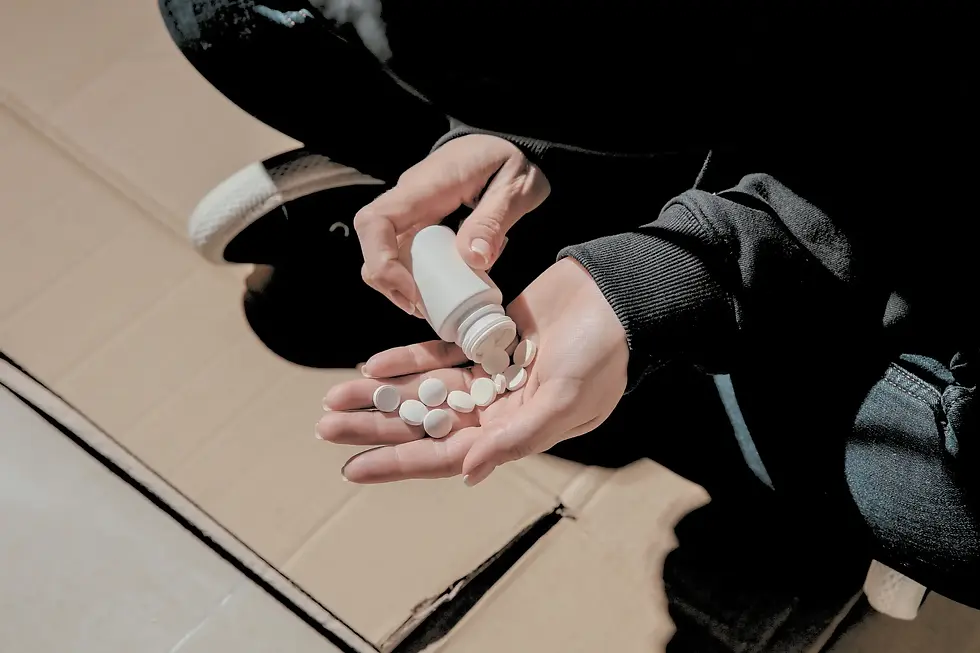Understanding Interventions for Substance Use Disorder
- Kris Samson
- May 25
- 3 min read

Is your loved one struggling with substance use disorder (SUD) and in need of help?
An intervention may be the next step, but it can be a hard step to take as a family member, friend, or partner.
An intervention involves friends and family members getting together to ask their loved one struggling with SUD to seek help.
Interventions serve as a way to get your loved one to acknowledge unhealthy and unsafe behavior and typically involve providing ultimatums concerning what will happen if they don’t get help.
A key step of the process of intervention for substance use disorder is helping make a plan to ensure your loved one can seek the care they need after accepting help.
Do Interventions for Substance Use Disorder Work?
Interventions work. The Association of Intervention Specialists estimates about 8 in 10 individuals choose to seek treatment after a professional intervention.
The data on non-professional interventions is limited, but that does not take away the power of community showing up for a loved one. It is important to remember interventions are not always well received by your loved one in need.
Celebrity comedian John Maulaney speaks to this in his groundbreaking Netflix special, Baby J, where he opens up about how an intervention led by star comedians such as Seth Myers, Bill Hader, and Nick Kroll almost didn’t cut it.
But in all seriousness, an intervention can be life saving. A recent study by the National Institutes for Health shows that family involvement can improve treatment entry, completion, and outcomes for loved ones dealing with substance use disorder.
How to Organize a Drug Addiction Intervention

Here are simple steps on how you can organize a drug addiction intervention.
Step 1. Work with a Professional
Although not necessary, friends and families may benefit from working with a mental health professional known as an interventionist. They may help you organize an effective intervention and understand what to expect.
You can lay the groundwork for setting up an intervention by setting a place and time, but a key part involves your loved one being ready to listen and recognize they need help.
Step 2. Invite Your “Team”
Your team may consist of family members, co-workers, and friends who are impacted by your loved one’s substance use who will also be key in supporting your loved one throughout their recovery journey.
Step 3. Determine a Place and Time
Your loved one should not be aware of the intervention in advance. Therefore, you must choose a place and time that seems natural.
For example, if they come home every day at four after work, consider scheduling a meeting at four at their home.
Step 4. Be Ready to Share
Ask everyone participating to make notes that describe how your loved one’s substance use has impacted their lives. Ask them to focus on facts that are hard to argue against.
For example, a wife may say, “The children and I were hurt when you couldn’t participate in our celebration because you were out drinking.”
These notes are not meant to be hurtful, but rather show how your loved one’s behavior reaches beyond their own life.
Step 5. Be Prepared to Provide Ultimatums

Attendees should also come up with ultimatums regarding what they will do if their loved one doesn’t get help, such as forcing them to move out of the home or cutting off funding and communication.
Setting such a boundary may be the hardest part of an intervention.
6. Develop a Clear Plan
The goal of the meeting should be acceptance and getting your loved one into treatment immediately.
Preparations should include organizing travel arrangements and admissions so they can seek care quickly. The idea is to make it easy for them to get help before they can think about it.
7. Provide Continued Support
The role of the intervention team does not end after the initial intervention.
Families and friends should continue to be active in their loved one’s recovery, ensuring they get the support they need at home.
Companion Recovery Offers the Support You Need
An intervention for substance use disorder can be effective in ensuring your loved one enters rehab to seek the care they need. The proper support will help them stay sober.
That’s where Companion Recovery comes in.
We act as companions, supporting individuals in their recovery journey. Our team offers coaching, transport services, and companionship. We aim to help your loved one live healthy and independently.
Contact us for the assistance your loved one may need.



Comments